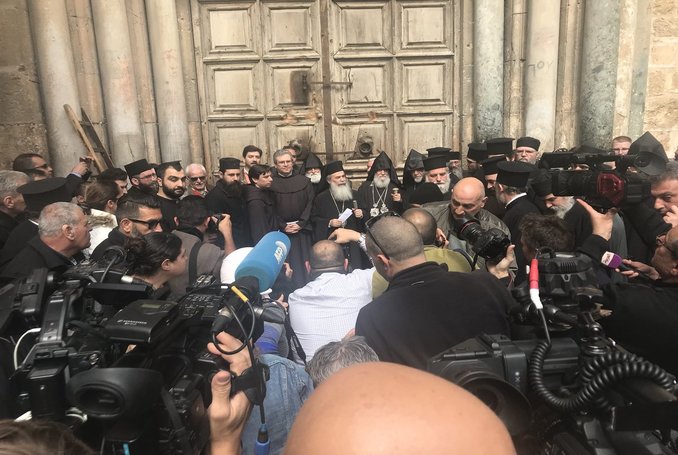
The Holy Sepulcher in Jerusalem was officially reopened early morning on Wednesday after being shut for three days in protest of Israeli policies.
The last and only other time the church doors were shut was in 1990 – for 48 hours – in protest of Jewish settlers who had occupied a building in the Christian quarter near the church.
Re-opening of the #HolySepulchre: the entrance into the church of the first group of people – 4 AM #Jerusalem pic.twitter.com/7RaZWVU3RF
— Beatrice Guarrera (@BGuarrera) February 28, 2018
On Sunday, leaders from the Roman Catholic, Armenian and Greek Orthodox churches announced they would be closing the church doors in protest of what they described as “discriminatory” Israeli policy aimed at weakening Christian presence in Jerusalem.
Church leaders said their decision was premised on several issues, including a bill recently introduced in Israel’s parliament that would allow the Israeli state to take over church properties leased to private companies.
#HolySepulchre shut down to protest 'alarming' Israeli policies https://t.co/z3frdO466B
— Catholic News Agency (@cnalive) February 26, 2018
Another development targeting churches, they said, were plans by the Israeli government to begin imposing taxes on church properties.
Following international pressure and condemnation by Palestinian Christians, Israel decided on Tuesday to suspend the legislation regarding collecting taxes from churches and their properties.
“This is a victory. We’re celebrating. Easter is coming and so there were hundreds of visitors who had to pray outside the church for three days,” Joudeh told Al Jazeera.
+++ Statement on the re-opening of the Church of the #HolySepulchre
"We announce that the Church of the Holy Sepulcher will be reopened to the pilgrims tomorrow, February 28th, 2018 at 4.00 AM"' https://t.co/tOvNf3G5Wy pic.twitter.com/kELXoBSH6e— Custodia – EN (@custodia_en) February 27, 2018
The leader of the Christian National Gathering in the Holy Land, Dimitri Deliani, said that the churches had won this battle against the Israeli occupation, which he described as a “war”.
Hana Amira, the head of the Supreme Presidential Committee for Church Affairs, told Palestinian government news agency Wafa that the stance of the heads of the churches, as well as the closure of the Church of the Holy Sepulcher, had foiled the Israeli plan temporarily.
(Al Jazeera, PC, Social Media)







